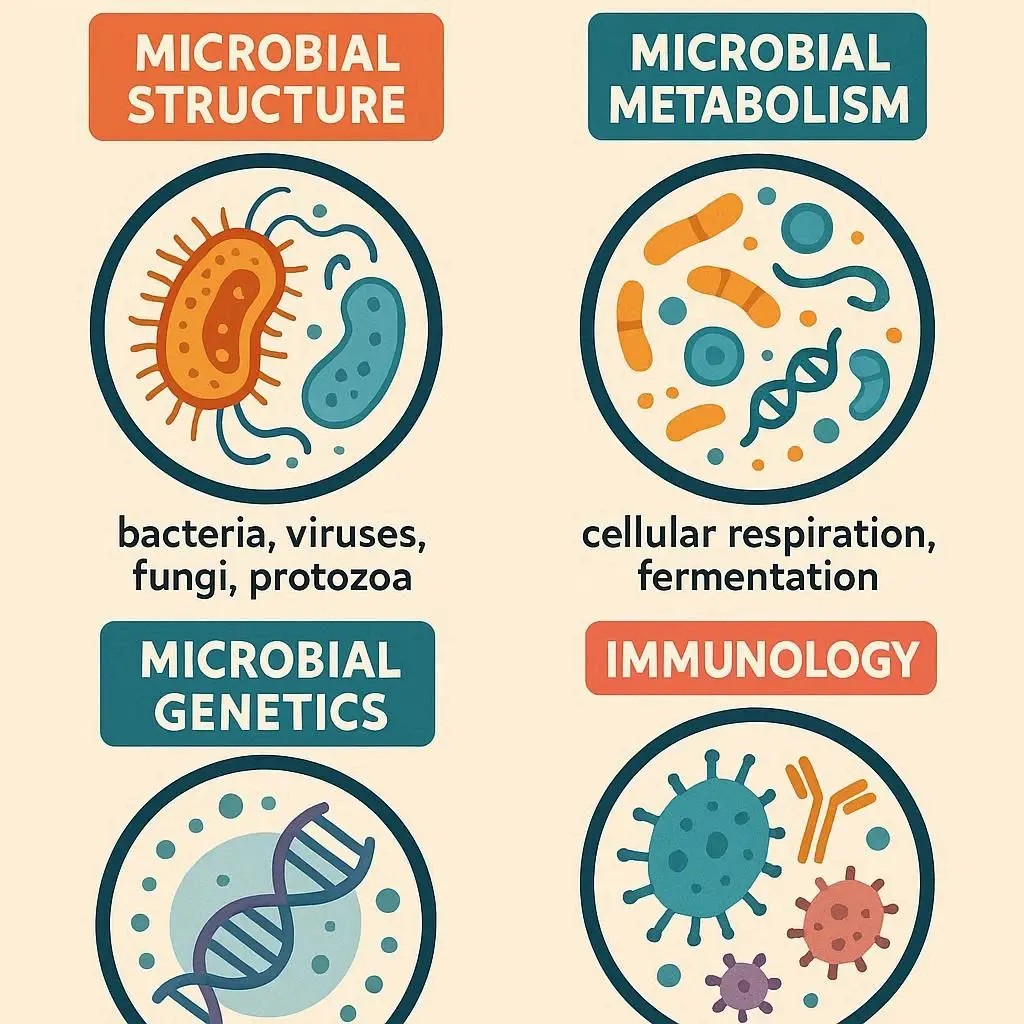What do you learn in microbiology course?
What You Learn in a Microbiology Course: Key Topics Explained
Microbiology is the study of microscopic organisms—bacteria, viruses, fungi, and protozoa—that play a critical role in human health, the environment, and industry. A microbiology course introduces students to the fascinating world of microbes and provides the foundation for careers in medicine, biotechnology, pharmaceuticals, food science, and research. If you’re wondering what you’ll actually study in a microbiology course, here’s a breakdown of the key topics typically covered.
1. Introduction to Microbiology
Most courses begin with an overview of microbiology’s history, pioneers like Louis Pasteur and Robert Koch, and the importance of microbes in everyday life. You’ll learn about the diversity of microorganisms and their role in ecosystems, medicine, and biotechnology.
2. Microbial Cell Structure and Function
Understanding the differences between prokaryotic and eukaryotic cells is central to microbiology. You’ll study:
Bacterial cell walls, membranes, and shapes
Structures like flagella, pili, and spores
How microbes grow, reproduce, and adapt to environments
3. Microbial Genetics and Molecular Biology
Microbiology courses dive into how genetic information is stored, expressed, and transferred in microbes. Key topics include:
DNA replication, transcription, and translation
Horizontal gene transfer (transformation, conjugation, transduction)
Plasmids, mutations, and antibiotic resistance
4. Virology: The Study of Viruses
Viruses are unique infectious agents that aren’t considered living organisms but can hijack host cells to reproduce. You’ll explore:
Virus structure and classification
Viral replication cycles
Common viral diseases and vaccines
5. Immunology Basics
Since microbes often interact with the human immune system, microbiology courses usually include an introduction to immunology. You’ll learn:
Innate vs. adaptive immunity
Antigens, antibodies, and immune responses
How vaccines and immunotherapies work
6. Pathogenic Microbiology
A major focus is understanding disease-causing microorganisms. You’ll study:
Bacterial, viral, fungal, and protozoan pathogens
Mechanisms of infection and virulence factors
How microbes spread and cause disease in humans
7. Microbial Ecology and Environmental Microbiology
Not all microbes are harmful. Many play beneficial roles in nature and industry. Topics often include:
Microbes in soil, water, and air
Biogeochemical cycles (carbon, nitrogen, sulfur)
Microorganisms in wastewater treatment and bioremediation
8. Applied and Industrial Microbiology
Microbiology has vast applications in technology and industry. You’ll explore how microbes are used in:
Antibiotic and vaccine production
Food fermentation (bread, yogurt, beer, cheese)
Biotechnology and genetic engineering
9. Laboratory Techniques in Microbiology
Practical lab skills are a vital part of most microbiology courses. Students learn how to:
Use microscopes to observe microbes
Culture bacteria using agar plates and broth media
Apply staining techniques (Gram stain, acid-fast stain)
Test for antibiotic sensitivity
A microbiology course goes far beyond memorizing bacteria names—it’s about understanding the hidden world of microorganisms and their impact on life, health, and the planet. By the end of the course, students gain both theoretical knowledge and hands-on lab experience, preparing them for careers in healthcare, research, and biotechnology.
Whether you’re pursuing medicine, nursing, laboratory science, or simply curious about microbes, microbiology provides a foundation that connects science directly to real-world challenges.
Microbiology Course Topics at a Glance
| Topic | What You Learn |
|---|---|
| Introduction to Microbiology | History, pioneers (Pasteur, Koch), importance of microbes in daily life |
| Microbial Cell Structure | Differences between prokaryotes & eukaryotes, cell walls, membranes, spores, flagella |
| Microbial Genetics | DNA replication, gene expression, mutations, plasmids, antibiotic resistance |
| Virology | Virus structure, replication cycles, major viral diseases, vaccines |
| Immunology Basics | Innate vs. adaptive immunity, antigens, antibodies, vaccine mechanisms |
| Pathogenic Microbiology | Bacterial, viral, fungal, protozoan pathogens; mechanisms of infection |
| Microbial Ecology | Roles in soil, water, air; nutrient cycles; wastewater treatment; bioremediation |
| Applied/Industrial Microbiology | Microbes in food production, pharmaceuticals, biotechnology |
| Laboratory Techniques | Microscopy, culture methods, Gram staining, antibiotic sensitivity testing |
Core Subjects and Topics in a Microbiology Course
A microbiology course provides a comprehensive overview of microorganisms and their interactions with the world.
How a Microbiology Course Covers Topics like Genetics and Microbial Physiology
A microbiology course delves into microbial genetics by exploring how microorganisms inherit and express genetic traits.
What practical skills and lab techniques will I learn in a microbiology course?
A microbiology lab component is essential for gaining hands-on experience with microorganisms.
What career paths can a microbiology course prepare me for?
A microbiology course opens doors to numerous career paths across various sectors. Many graduates work in clinical labs as medical laboratory scientists, diagnosing infectious diseases. Others find roles in the pharmaceutical industry researching and developing new antibiotics and vaccines, or in the food and beverage industry ensuring product safety and quality. Environmental microbiologists work on water quality and bioremediation, while academic researchers study microbial processes to advance scientific knowledge. A microbiology degree can also be a strong foundation for further education in medicine, dentistry, or veterinary medicine.
How is a microbiology course relevant to fields like medicine and biotechnology?
Microbiology is fundamentally linked to medicine as the study of pathogens is crucial for diagnosing, treating, and preventing infectious diseases. Medical professionals must understand how microbes cause disease (pathogenesis), how they are transmitted, and how to use antibiotics and vaccines effectively. In biotechnology, microbiology is the cornerstone of many applications. Microbes are used as "cellular factories" to produce valuable products like insulin, antibiotics, and biofuels. Genetic engineering techniques learned in microbiology can be applied to modify microorganisms to produce these substances more efficiently, making the course directly relevant to modern industrial and medical advances.













